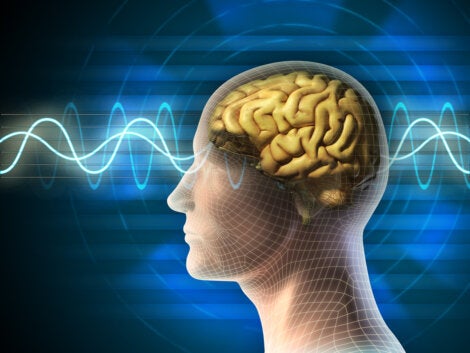Forensic Neuropsychology: Definition, Purpose, and Applications

Have you ever wondered about the role of a neuropsychologist during a legal trial? As you probably know, neuropsychology studies the relationship between the brain and cognitive, behavioral, and emotional functions. All of this helps us better understand disorders and day-to-day problems. Within the discipline, there are specialties that apply to specific areas of knowledge. One of those is forensic neuropsychology.
This field got its start in the 80s thanks to its usefulness in the court of law. It’s interesting to learn about what forensic neuropsychology is and how it’s applied in different contexts. It’s also helpful for knowing when it’s necessary to seek out a specialist.

The definition of forensic neuropsychology
Forensic neuropsychology is the application of neuropsychology in the legal sphere. Forensic neuropsychologists offer their testimony when there are people involved in a trial with some kind of cognitive damage or dysfunction. They play an important role in cases where the injured individual is seeking compensation.
Historically, psychologists started to act as witnesses in the court of law in 1960 thanks to an iconic case called Jenkins v. United States. The DC Court of Appeals recognized the usefulness of having expert opinions on mental illness.
That being said, forensic psychology didn’t make its appearance until the 80s. It was brought on by a variety of factors, such as:
- An increase in quantitative studies about the relationship between behavior and the brain.
- The interpretation strategies used to infer the presence, type, and localization of neurological pathology.
- Determining the presence of a disability.
- A description of the behavioral and cognitive characteristics of every neurological illness.
- The implication of damage to psychosocial functioning.
- The determination of prognoses.
- Decisions about the most appropriate interventions.
What’s the goal of forensic neuropsychology?
As we explained above, forensic neuropsychology applies the models, methodology, instrumentation, and knowledge of clinical neuropsychology to the context.
It takes ideas and roles primarily from the forensic sphere thanks to the problems and situations it has to deal with. In other words, they aren’t trying to determine whether or not an individual has a cognitive problem but rather how these difficulties specifically affect the legal issue at hand.
Experts have determined that the main role of forensic neuropsychology in criminal and civil lawsuits are the following:
- Determine the dysfunction of an individual.
- Establish how a dysfunction affects their daily lives.
- Provide their expert opinion on what kind of prognoses this deficiency might lead to.
- Establish a relationship between the lawsuit and the dysfunction.
Therefore, the goal is to make a sensitive and reliable identification of disorders, starting with a description, and establishing a relationship with the central nervous system. Likewise, a forensic neuropsychologist can give recommendations that include evaluation and treatment.
Neuropsychological reports: is there a difference between the clinical and forensic contexts?
A neuropsychological report is written post-evaluation. In it, the expert summarizes the results of their evaluation. It’s important to note, however, that different specialties have different goals and components. Next, we’ll talk about what they have in common and how they differ.
Here’s what they have in common:
- Clinical history. This is a report of the individual’s medical history and social development.
- The specificity of the injury. A description of the location of the injury and what caused it.
- Alterations. These are the results of the evaluation related to the difficulties that the individual might have on a cognitive, emotional, and social level. It also specifies the seriousness of the injury.
- Prognosis and rehabilitation. This part of the report talks about the potential long-term effects of the injury. They might also make some recommendations about care and recovery.
There are also some important differences, as we mentioned earlier. The forensic report should include, first and foremost, the causal link between the injury and changes brought about by that injury. The changes related to the individual’s work and home activity are especially important.
Secondly, the report should include the individual’s level of disability in terms of the activities we mentioned above. They should explicitly show the problems they might have at work or why they can’t work at all.
Lastly, the report has to show if the effects of the injury are lasting and if they could improve or worsen in the future. This is particularly important, as it affects the kind of compensation the individual might be awarded by the court.

Applications for forensic neuropsychology
There are two broad legal categories where forensic neuropsychology is applied. It can have a significant impact on the outcome of a lawsuit.
Civil and labor law
- Civil disability or interdiction. In this case, the evaluation provides information about how the injury affects the individual and the functional consequences. It indicates whether or not the person has a disability.
- Evaluation of disability, consequences, and damages. This is where the forensic neuropsychological evaluation is the most important. It evaluates the cognitive and emotional side effects caused by brain injury. The reason for this evaluation might be of legal nature since the report determines whether or not the individual will receive compensation or go on disability.
- Determination of work disability. In this case, the specialized neuropsychologists determine the existence of long-term brain damage. They also explain what effects the damage will have on the individual’s work abilities and skills.
Criminal law
Criminal law is another area of law where neuropsychologists play an important role. Specifically when someone involved in a case has pathologies related to brain damage.
They also identify uncommon symptoms that aren’t caused by neurological pathology. Among those are: simulations or the increase in cognitive defects brought on by psychiatric disorders. Forensic neuropsychologists often work in the following contexts:
- Determining an individual’s mental fitness for court appearances. Here, the neuropsychologist helps objectively determine the presence and magnitude of behavioral and cognitive issues. They also indicate if they could interfere with the fulfillment of legal processes.
- Criminal responsibility. In this case, the role of the neuropsychologist is to provide information that refutes or proves the presence of cognitive issues. All of this is related to whether the individual understands the criminality of their actions or not. They also determine if the individual can be held responsible for the criminal behavior they’re accused of.
- Evaluating victims. Here, the evaluation focuses on the potential side effects the victim might be suffering due to the criminal activity at hand.
In conclusion, it’s important to understand that forensic neuropsychology, despite being a relatively new field, has had an important impact in the legal sphere. That’s because the way the human brain works has significant repercussions on the decisions that are made in a legal process. At the end of the day, these evaluations and opinions often determine the legal verdict.
Have you ever wondered about the role of a neuropsychologist during a legal trial? As you probably know, neuropsychology studies the relationship between the brain and cognitive, behavioral, and emotional functions. All of this helps us better understand disorders and day-to-day problems. Within the discipline, there are specialties that apply to specific areas of knowledge. One of those is forensic neuropsychology.
This field got its start in the 80s thanks to its usefulness in the court of law. It’s interesting to learn about what forensic neuropsychology is and how it’s applied in different contexts. It’s also helpful for knowing when it’s necessary to seek out a specialist.

The definition of forensic neuropsychology
Forensic neuropsychology is the application of neuropsychology in the legal sphere. Forensic neuropsychologists offer their testimony when there are people involved in a trial with some kind of cognitive damage or dysfunction. They play an important role in cases where the injured individual is seeking compensation.
Historically, psychologists started to act as witnesses in the court of law in 1960 thanks to an iconic case called Jenkins v. United States. The DC Court of Appeals recognized the usefulness of having expert opinions on mental illness.
That being said, forensic psychology didn’t make its appearance until the 80s. It was brought on by a variety of factors, such as:
- An increase in quantitative studies about the relationship between behavior and the brain.
- The interpretation strategies used to infer the presence, type, and localization of neurological pathology.
- Determining the presence of a disability.
- A description of the behavioral and cognitive characteristics of every neurological illness.
- The implication of damage to psychosocial functioning.
- The determination of prognoses.
- Decisions about the most appropriate interventions.
What’s the goal of forensic neuropsychology?
As we explained above, forensic neuropsychology applies the models, methodology, instrumentation, and knowledge of clinical neuropsychology to the context.
It takes ideas and roles primarily from the forensic sphere thanks to the problems and situations it has to deal with. In other words, they aren’t trying to determine whether or not an individual has a cognitive problem but rather how these difficulties specifically affect the legal issue at hand.
Experts have determined that the main role of forensic neuropsychology in criminal and civil lawsuits are the following:
- Determine the dysfunction of an individual.
- Establish how a dysfunction affects their daily lives.
- Provide their expert opinion on what kind of prognoses this deficiency might lead to.
- Establish a relationship between the lawsuit and the dysfunction.
Therefore, the goal is to make a sensitive and reliable identification of disorders, starting with a description, and establishing a relationship with the central nervous system. Likewise, a forensic neuropsychologist can give recommendations that include evaluation and treatment.
Neuropsychological reports: is there a difference between the clinical and forensic contexts?
A neuropsychological report is written post-evaluation. In it, the expert summarizes the results of their evaluation. It’s important to note, however, that different specialties have different goals and components. Next, we’ll talk about what they have in common and how they differ.
Here’s what they have in common:
- Clinical history. This is a report of the individual’s medical history and social development.
- The specificity of the injury. A description of the location of the injury and what caused it.
- Alterations. These are the results of the evaluation related to the difficulties that the individual might have on a cognitive, emotional, and social level. It also specifies the seriousness of the injury.
- Prognosis and rehabilitation. This part of the report talks about the potential long-term effects of the injury. They might also make some recommendations about care and recovery.
There are also some important differences, as we mentioned earlier. The forensic report should include, first and foremost, the causal link between the injury and changes brought about by that injury. The changes related to the individual’s work and home activity are especially important.
Secondly, the report should include the individual’s level of disability in terms of the activities we mentioned above. They should explicitly show the problems they might have at work or why they can’t work at all.
Lastly, the report has to show if the effects of the injury are lasting and if they could improve or worsen in the future. This is particularly important, as it affects the kind of compensation the individual might be awarded by the court.

Applications for forensic neuropsychology
There are two broad legal categories where forensic neuropsychology is applied. It can have a significant impact on the outcome of a lawsuit.
Civil and labor law
- Civil disability or interdiction. In this case, the evaluation provides information about how the injury affects the individual and the functional consequences. It indicates whether or not the person has a disability.
- Evaluation of disability, consequences, and damages. This is where the forensic neuropsychological evaluation is the most important. It evaluates the cognitive and emotional side effects caused by brain injury. The reason for this evaluation might be of legal nature since the report determines whether or not the individual will receive compensation or go on disability.
- Determination of work disability. In this case, the specialized neuropsychologists determine the existence of long-term brain damage. They also explain what effects the damage will have on the individual’s work abilities and skills.
Criminal law
Criminal law is another area of law where neuropsychologists play an important role. Specifically when someone involved in a case has pathologies related to brain damage.
They also identify uncommon symptoms that aren’t caused by neurological pathology. Among those are: simulations or the increase in cognitive defects brought on by psychiatric disorders. Forensic neuropsychologists often work in the following contexts:
- Determining an individual’s mental fitness for court appearances. Here, the neuropsychologist helps objectively determine the presence and magnitude of behavioral and cognitive issues. They also indicate if they could interfere with the fulfillment of legal processes.
- Criminal responsibility. In this case, the role of the neuropsychologist is to provide information that refutes or proves the presence of cognitive issues. All of this is related to whether the individual understands the criminality of their actions or not. They also determine if the individual can be held responsible for the criminal behavior they’re accused of.
- Evaluating victims. Here, the evaluation focuses on the potential side effects the victim might be suffering due to the criminal activity at hand.
In conclusion, it’s important to understand that forensic neuropsychology, despite being a relatively new field, has had an important impact in the legal sphere. That’s because the way the human brain works has significant repercussions on the decisions that are made in a legal process. At the end of the day, these evaluations and opinions often determine the legal verdict.
All cited sources were thoroughly reviewed by our team to ensure their quality, reliability, currency, and validity. The bibliography of this article was considered reliable and of academic or scientific accuracy.
- Fernández Guinea, S. (2001). La neuropsicología forense: Consideraciones básicas y campos de aplicación. Revista de Neurología, 32(08), 783. https://doi.org/10.33588/rn.3208.2000188
- Jarne, A. y Aliaga, A. (Comps.) (2010). Manual de neuropsicología forense. De la clínica a los tribunales. Barcelona, España: Editorial Herder.
This text is provided for informational purposes only and does not replace consultation with a professional. If in doubt, consult your specialist.







